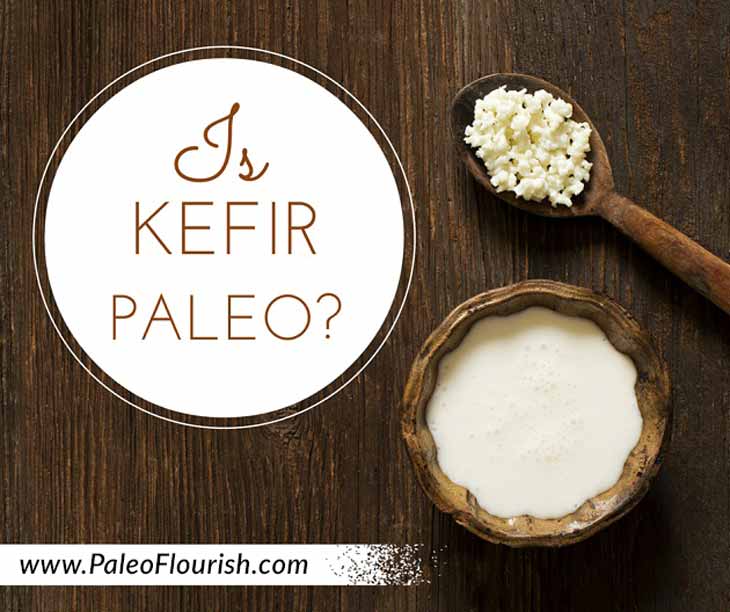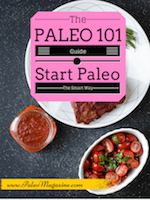Is Kefir Paleo?

As recently as 3 years ago, I had zero idea what kefir was.
You may or may not be in the same boat, but I couldn’t even pronounce the word. (If you’re wondering, it’s pronounced kuh-FEER.)
What is Kefir?
Kefir is a type of carbonated dairy product that has been around for a very long time.
Evidence shows that people have been fermenting drinks for thousands of years (around 5000 BC for the Babylonians), and kefir is one such drink.
Heralded around Europe and Asia for its healing properties in centuries past, kefir can be made from the milk of any ruminant (any animal that does not completely chew the vegetation that it eats, including goats, cows, sheep, and other milk-producing animals).
Because kefir is fermented milk, it is slightly sour-tasting; the carbonation comes from the special blend of bacteria that are put into the milk to culture it.
Is Kefir Healthy?
The bacteria in kefir form special colonies, and as a result, kefir is one of the most powerful probiotics in the world.
And by now, you’re probably aware that the health of our gut bacteria is critical to our overall health—from helping us sleep better to aiding in weight loss, healing the gut, and preventing allergies.
On top of its impressive probiotic properties, kefir also has a good amount of vitamin K2, one of the vitamins most often missing in the American diet. Among other health benefits, vitamin K2 aids the processing of calcium and helps ensure that it ends up strengthening bones rather than getting deposited where it doesn’t belong (like the arteries).
Other studies have shown that kefir helps to calm an overactive immune system. Kefir lactobacilli, a rod-shaped bacteria in kefir, helps to tell your immune system to “stand down” against things that aren’t really threats (like pet dander and dust) that cause the stuffy nose and watery eyes we get with allergies.
But Isn’t Kefir a Form of Dairy?
As you probably know, many people argue that a Paleo diet should exclude all dairy.
From my perspective, this doesn’t make sense, as I’ve pointed out before. Dairy is super-nutritious, has helped sustain many very healthy civilizations, and is particularly healthy when raw or fermented.
However, even though I support the consumption of raw and fermented dairy, I still advise everyone to remove dairy completely from their diets for at least 60 days before re-introducing raw and fermented dairy (like Kefir). If you don’t perform this sort of elimination, then it’s likely that you’ll never really know how your body reacts to dairy, and many people don’t react well to any dairy.
If, after such an elimination, you find that fermented dairy like kefir doesn’t cause you any gastro-intestinal discomfort or any signs of inflammation (stiffness, arthritis, acne, etc.), then you probably want to consider some of the powerful benefits that kefir can add to your diet.
What do other Paleo gurus say?
Mark Sisson says: “People have been eating fermented foods for thousands of years willingly, and even longer accidentally. The evidence shows there’s definitely something to it, and I think it can be a vital part of a healthy Primal Blueprint diet. If you can tolerate dairy, go for full-fat Greek style yogurt…[and] kefir is another possibility.”
Chris Kresser says: “Kefir is a great source of vitamins, minerals, probiotics, and a variety of other unique compounds that can greatly contribute to your overall health and wellbeing. I highly recommend including this nutritious superfood in your diet.”
Is Kefir Paleo?
Yes.
Personally, I can’t stand kefir. I just hate the taste.
But if you like it and can tolerate it, then kefir is a great addition to your diet. But do pay attention to whether or not you are dairy-intolerant. If you cannot consume dairy, the health benefits of kefir no longer outweigh the inflammation you’ll cause by adding it to your diet.
Images:
Copyright (c) Dušan Zidar from Fotolia

